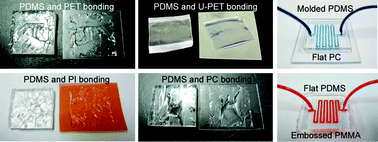A facile route for irreversible bonding of plastic-PDMS hybrid microdevices at room temperature†
Abstract
Plastic materials do not generally form irreversible bonds with poly(dimethylsiloxane) (PDMS) regardless of

* Corresponding authors
a
Gachon BioNano Research Institute & Division of BioNano Technology and College of BioNano Technology, Kyungwon University, San 65 Bokjeong-dong, Sujeong-gu, Seongnam, Gyeonggi-do, Korea
E-mail:
nylee@kyungwon.ac.kr
Fax: +82-31-750-8774
Tel: +82-31-750-8556
Plastic materials do not generally form irreversible bonds with poly(dimethylsiloxane) (PDMS) regardless of

 Please wait while we load your content...
Something went wrong. Try again?
Please wait while we load your content...
Something went wrong. Try again?
L. Tang and N. Y. Lee, Lab Chip, 2010, 10, 1274 DOI: 10.1039/B924753J
To request permission to reproduce material from this article, please go to the Copyright Clearance Center request page.
If you are an author contributing to an RSC publication, you do not need to request permission provided correct acknowledgement is given.
If you are the author of this article, you do not need to request permission to reproduce figures and diagrams provided correct acknowledgement is given. If you want to reproduce the whole article in a third-party publication (excluding your thesis/dissertation for which permission is not required) please go to the Copyright Clearance Center request page.
Read more about how to correctly acknowledge RSC content.
 Fetching data from CrossRef.
Fetching data from CrossRef.
This may take some time to load.
Loading related content
